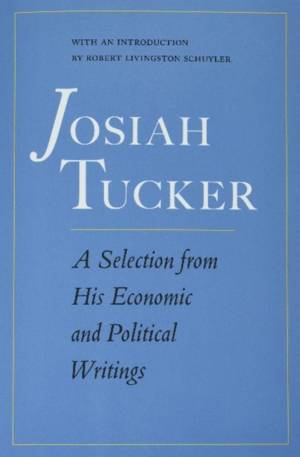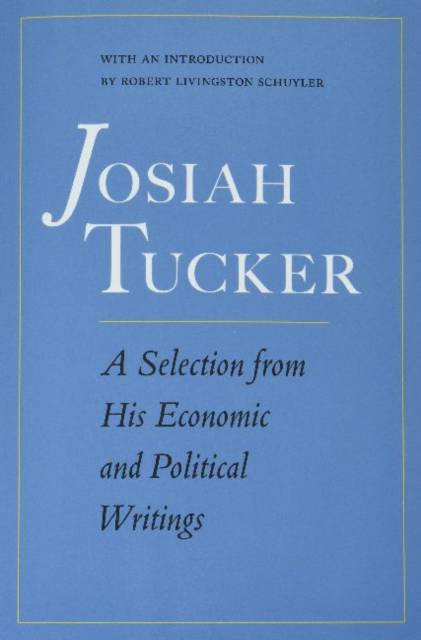
- Retrait gratuit dans votre magasin Club
- 7.000.000 titres dans notre catalogue
- Payer en toute sécurité
- Toujours un magasin près de chez vous
- Retrait gratuit dans votre magasin Club
- 7.000.0000 titres dans notre catalogue
- Payer en toute sécurité
- Toujours un magasin près de chez vous
Josiah Tucker: A Selection from His Economic and Political Writings
A Selection from His Economic and Political Writings
Josiah Tucker
Livre broché | Anglais
23,45 €
+ 46 points
Format
Description
Josiah Tucker was one of the foremost thinkers of eighteenth-century England in the fields of economics, international relations, political theory, and imperialism. In his introduction, Robert Livingston Schuyler writes: Tucker was one of the first . . . to envisage the whole range of economic life as a proper and worthy subject of scientific inquiry . . ., [which] ought to be cultivated as such, especially by statesmen and legislators. This opinion he expressed as early as 1749, before anybody had produced a systematic treatise on economics. Tucker shared the opinion, prevalent in his day, that Great Britain was underpopulated and observed with regret the immigration to America, believing that the colonies brought Britain no benefits. He thought instead that colonies were too costly to be beneficial, and, as early as 1749, he asserted that American colonies would seek independence as soon as they no longer needed Great Britain's assistance. He is one of the few men in England who consistently wrote and preached that the separation of the colonies would spell the ruin of England. Born of Welsh peasant stock in Laugharne, Carmarthenshire, in 1713, Tucker was educated at St. John's College, Oxford, and became successively a curate and rector at St. Stephen's Church in Bristol. This led him to take considerable interest in politics and trade, as Bristol was second only to London in commerce in Great Britain during Tucker's years of residence there. During the greater portion of a long life he poured out a succession of pamphlets on these matters. He was appointed dean of Gloucester in 1758. He died in 1799 and was buried in Gloucester Cathedral. This edition (originally published by Columbia University Press in 1931) contains seven of Tucker's writings, two of which are of special economic interest: "The Elements of Commerce and Theory of Taxes" and "Instructions for Travellers." In the former selection, Tucker denounces monopoly in all its forms, yet he occupies an intermediate position between the rigid exclusiveness of mercantilism and the freedom of trade of Adam Smith. While he ventures from Smith in some ways, it is often said that Tucker's work anticipates the classic doctrines of Wealth of Nations, which was written twenty years later. Other writings in the volume include a remarkable tract on war, which illustrates progressive, pacifistic thought; and a treatise on civil government, written to refute the contract theory of the state. Tucker disposed of the fallacy that one nation could thrive only at the expense of another and condemned going to war for the sake of trade advantages. An original introduction, by Columbia history professor Robert Livingston Schuyler, places Tucker's writings in their historical and biographical setting and emphasizes what seems most significant in his thought as an economist, a pacifist, an antiimperialist, and a political theorist. Throughout writings in this book, Tucker reveals with striking clearness the process of internal disintegration of the mercantilist doctrine that was going on during the eighteenth century, even before Hume and Smith had provided an acceptable substitute. Republication of this collection should garner a diverse, cross disciplinary readership, from students and scholars of eighteenth-century thought (especially with regard to economics), to those of political theory and Anglo-American relations.
Spécifications
Parties prenantes
- Auteur(s) :
- Editeur:
Contenu
- Nombre de pages :
- 576
- Langue:
- Anglais
Caractéristiques
- EAN:
- 9780865979307
- Date de parution :
- 30-11-21
- Format:
- Livre broché
- Format numérique:
- Trade paperback (VS)
- Dimensions :
- 152 mm x 229 mm
- Poids :
- 929 g

Les avis
Nous publions uniquement les avis qui respectent les conditions requises. Consultez nos conditions pour les avis.






